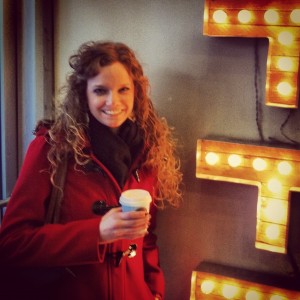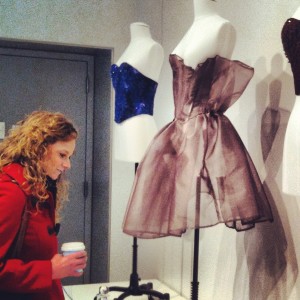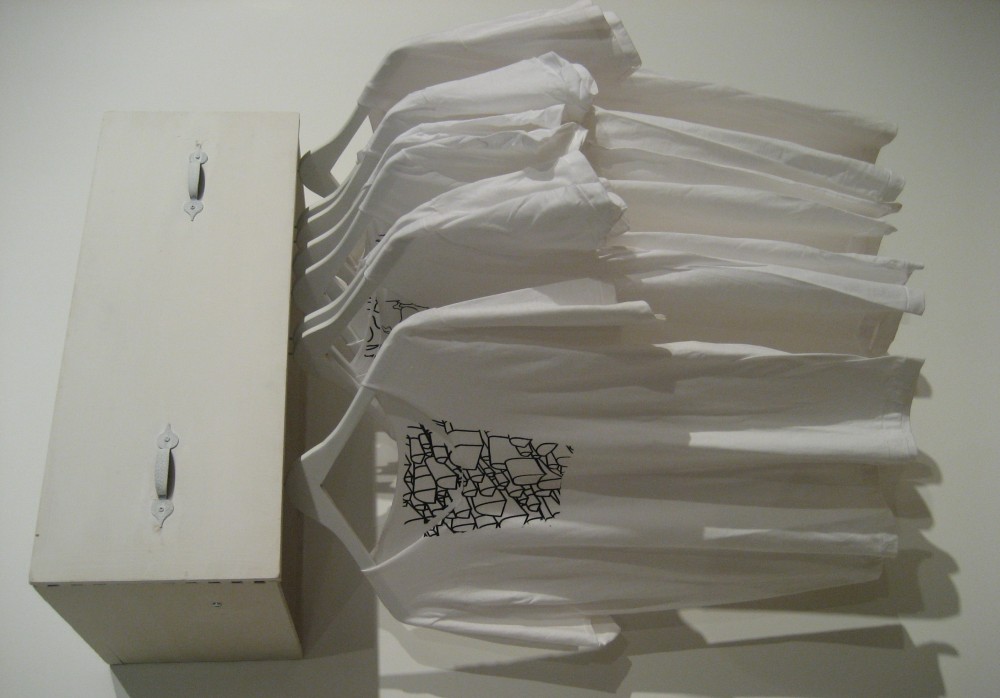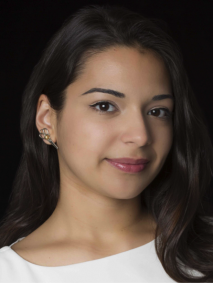Fashion Studies
Parsons School of Design's MA Fashion Studies
Student Profile: Bethany Camarati MAFS ’14 Shares Her Thoughts on the MA Fashion Studies program
On a cold Thursday afternoon in February, Bethany Camarati MAFS class of 2014 and I walked around Greenwich Village, explored the Parsons’ “Sophie Gimbel: Fashioning American Couture” exhibition, and sat down at Joe, a local coffee shop nearby Parsons’ campus to talk about Bethany’s thoughts and experiences in the MA Fashion Studies program.
Tell me a little about your background and why you decided to apply to the MA Fashion Studies program.
I’m originally from Cleveland, Ohio and I went to Adrian College in Adrian, Michigan, it’s close to the University of Michigan. I received my BFA in Studio Art and Design with a focus in Textile Design and a minor in Art History. After graduating I worked for Abercrombie and Fitch and did design work for their menswear. I really enjoyed that however I did not like what the company stood for, so I totally removed myself from fashion and went back to Adrian College and worked in development. I soon realized I did miss fashion, so I stayed there for five years, but within that time period, I studied abroad in London and Paris. I loved those experiences because they reaffirmed that I wanted to go back into fashion. I did an internship at WGSN Fashion Trend Forecasting and Analysis while in London. That internship was definitely the breaking point and I knew I had to go back and take a more academic route. I found the MA Fashion Studies program at Parsons and applied.
When I was applying, I thought the program was so unique and exciting. What specifically drew you to the MAFS program?
What attracted me to the program was being able to exercise my writing ability. I wanted to explore the more academic theories of design and fashion. I had thought of applying to possibly an MFA program to do the more intensive studio work; however, I really wanted to understand and study the other side of fashion and Parsons’ MA Fashion Studies program provided exactly what I was looking for.
How was the transition moving to New York City?
The transition coming to New York City, I think it was easy to transition because of my experience abroad. But, it was a new experience and I did not really know what to expect. I only had visited New York once before moving to see Parsons for the Graduate School Expo. I have had to adjust to apartment living—coming from my own place to sharing a small apartment. Over the past few months, I have been getting acquainted with the city, but I think the transition went smoothly.
In your exploration of the city, is there a favorite neighborhood, or spot, that you like to frequent?
I felt like I did not get to explore as much last semester, so I am hoping this semester I will be able to. But currently I live in Little Italy, so I am close to SoHo and the Lower East Side. I have gotten to really know those areas. Some friends of mine live on the Upper East Side, which is great because I get to venture uptown and explore more parts of the city. This past weekend I went up to Columbia University, which was beautiful and reminded me of a movie set with its tree-lined walks. It was so picturesque and offered a nice, quiet break from the noisy city.
After a semester in the MA Fashion Studies program, how has the program supported, changed, or added to your views of fashion’s role in our culture? Coming into the program, it was so nice to be welcomed and surrounded by peers who really understood how and why fashion matters.
Yes, coming into the program knowing that there were other people interested in not just fashion, but the greater meaning behind it was comforting. Many people always ask, “Why do you want to study fashion?” or “So, your program tells people what they should wear?” Fashion Studies is so much more than that—it is not even the tip of the iceberg. It’s nice to be surrounded by people that are interested in fashion on another level—whether their interest lies in sustainability, gender, culture, psychology, and even the fast fashion phenomenon. Over the break, I went shopping with my younger sister and was much more aware of my shopping choices. We live in such a disposable society, and after our discoveries in class, I found myself not wanting to buy just any piece of clothing. The whole time I was home, I purchased just two items. I wanted to get something nice, something of quality, and I was more thoughtful about the overall process.
What is your opinion on the MA Fashion Studies’ faculty thus far?
I have found the faculty to be very encouraging. They genuinely want to help us. Recently, I met with Christina Moon, the Director of MA Fashion Studies, to discuss my options if I want to go a more fashion-centered route as opposed to a more academic route. She really helped me decide what I wanted to do after graduation. Christina, as well as the other faculty members, are very open to molding the program to fit the students’ needs, which is really nice. It has been so enjoyable because the faculty come from such diverse backgrounds. They bring these new concepts and perspectives to Fashion Studies that we can then build off of.
What opportunities within and outside of Parsons are you pursuing?
This semester, I am doing an independent study with Dr. Hazel Clark. I think what initially sparked it was that I was craving to become familiar with the history behind New York fashion. I know it sounds vague, but because I have studied in two fashion forward cities, Paris and London, I felt I should educate myself on how New York City became a fashion capital. I want to learn about its origins, the garment district, etc. Dr. Clark will help me explore those options. For the independent study, I will probably do a literary review or a more in-depth annotated bibliography, possibly as a precursor for my thesis. Dr. Clark has given me sites I can go and visit, one of which is the Jewish Museum, as well as places I can people watch. I really want to understand how New York fashion evolved—a nitty-gritty education. It will be beneficial for me because of my interest in trendsetting. I hope to establish research on New York fashion, possibly New York Fashion Week. Working with Dr. Clark will be greatly beneficial. I do want to pursue an internship for the summer. Also, I would love to explore the possibility of going to Parsons’ Paris campus. There is a trends course that interests me. It would be a great addition to our education in New York to do over our winter break or during the summer. I absolutely adore Paris!
I know we just started the second semester of our first year in the Fashion Studies program at Parsons, but what do hope to do with your master’s degree in Fashion Studies?
I’d love to research how trends evolve. My internship with WGSN Fashion Trend Forecasting and Analysis was great, and I would like to find a fashion trend forecasting company here in New York. I know that a lot of the students that have graduated from the MA Fashion Studies program have followed a more academic route. I think that is so impressive, but I don’t think that teaching or continuing on to the PhD level would be of interest to me. I would like to find a place within the fashion industry after graduation. With my background in textile design, I am hoping that with the addition of Fashion Studies, it will be a perfect blend of the creative and academic sides of fashion.
Yes, I think after finishing the program, we will be able to bring a new perspective to the field and fashion industry. I do believe that people are starting to recognize the void our program fills as well as the mutually exclusive relationship between culture and commerce. The MA Fashion Studies program is so new, so progressive. It might take the rest of the world time to recognize its relevance and importance.
Actually, that is something that I was thinking about this morning! I feel like Fashion Studies is a trend on its own and that it really is evolving and starting to be recognized as a rich field of study. I was reading an article in my local newspaper in Cleveland about New York Fashion Week. The article discusses how there is so much more to fashion. Going beyond its perceived superficiality, the journalist mentioned academic study, fashion museum curation, etc. Within the next five years, I believe Fashion Studies will be something more and more people will want to pursue. We are just ahead of the game. I really do feel that it is catching on—more and more people are seeing the value of fashion studies.
I completely agree with you. When I say that I am in a fashion studies program, most people automatically assume that I am designing clothes, but there is so much more to the fashion industry than just the designer. Parsons’ MA Fashion Studies program has really allowed us to pursue these other aspects.
Yes, and I think that is what my independent study with Dr. Clark exhibits. Just learning about the garment district, thinking about all of the immigrants coming into the city to find jobs. Who were those people? What is their story? A lot of them were Jewish. I find all of it so intriguing.
Yes, New York’s Garment District is such a fascinating topic. There is so much history to explore. To conclude, is there anything you would like to tell potential applicants about Parsons’ MA Fashion Studies program?
I love Parsons and I am so pleased with my decision to pursue my master’s degree in Fashion Studies. For potential applicants, I would say—because I was out of school for five years—is to not have that discourage you. I was really nervous about going back to school, and I had thought about applying for a while. I just finally just did it, and obviously it has been such a positive experience so far. If you are interested in applying, definitely visit the school and contact admissions to see if there are any current students you can speak with.




